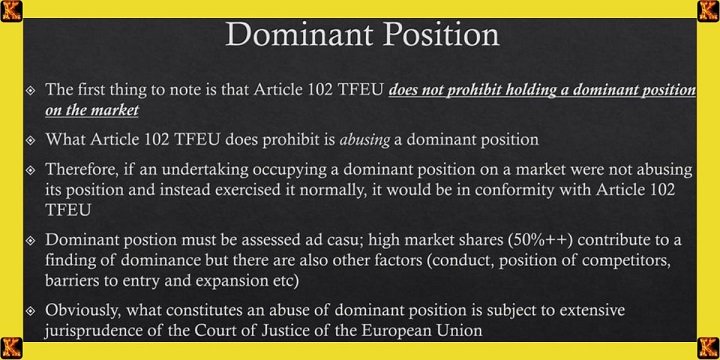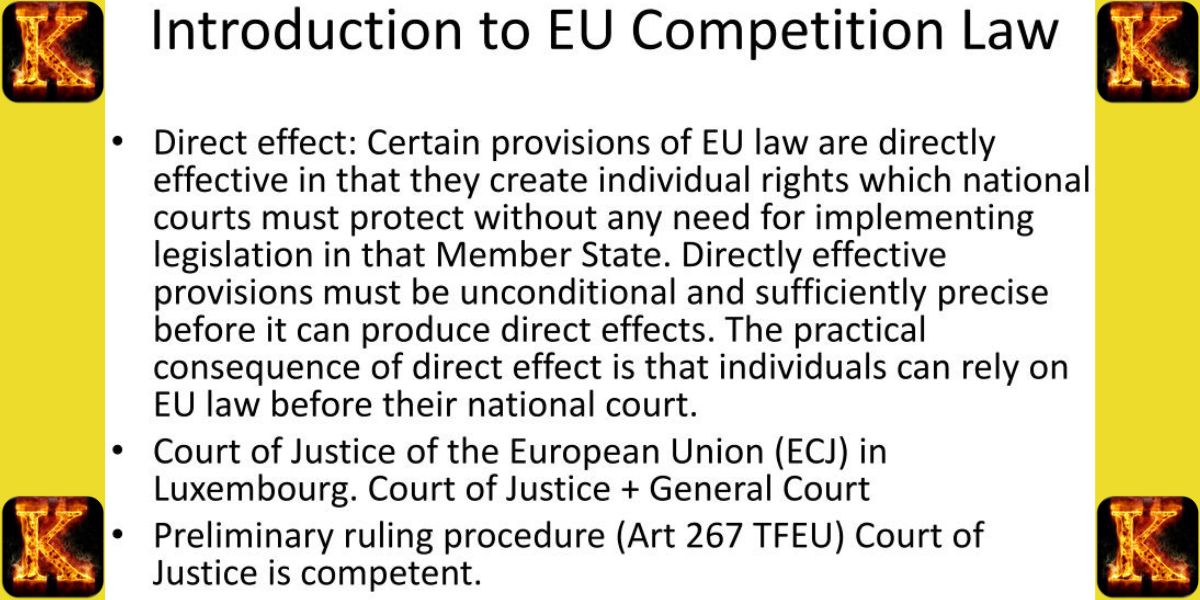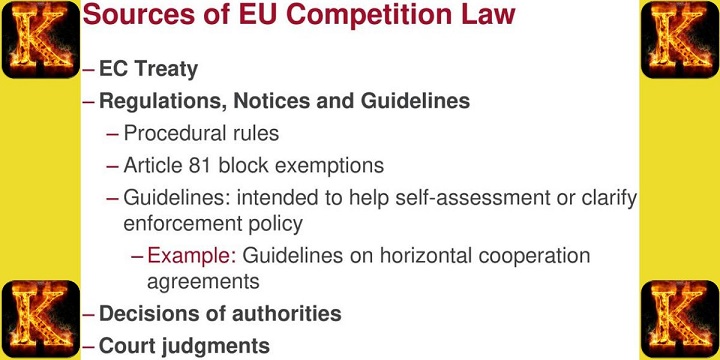Introduction:
The rapid evolution of digital technology has transformed the way video games are consumed, particularly in the realm of personal computer (PC) gaming. With the advent of the internet, the traditional model of purchasing physical copies of PC games has been replaced by digital downloads. This shift has led to the emergence of online distribution platforms, such as Vapour, owned by Alfa, which has become a dominant player in the
European Union's PC gaming market. However, concerns have been raised regarding Alfa's conduct, with allegations of abuse of dominance surfacing. This essay explores the intricate legal landscape surrounding Alfa's actions, focusing on its potential abuse of dominance in the EU's PC gaming market.
Relevant Market Definition:
In defining the relevant market for PC gaming, it is essential to consider both the
product and geographic dimensions. The product market encompasses digitally downloadable PC games, which have increasingly become the preferred choice for gamers worldwide. Geographically, the focus is on the European Union, where Vapour operates and exerts its influence. As the primary platform for digital PC game distribution in the EU, Vapour's dominance shapes the competitive landscape of the market.

-
Product Dimension:
- The product market primarily encompasses digitally downloadable PC games, which have witnessed a significant shift in consumer preference away from physical copies towards digital distribution channels.
- This shift reflects the evolving nature of gaming consumption habits, with PC gamers increasingly favoring the convenience and accessibility offered by digital downloads.
- Digitally downloadable PC games include a wide range of genres, from action-adventure to role-playing games, catering to diverse gaming preferences.
- Key attributes of digitally downloadable PC games include ease of access, instant availability, and the absence of physical media, making them an attractive option for modern gamers.
-
Geographic Dimension:
- Geographically, the focus is on the European Union, where Vapour, owned by Alfa, operates as the primary platform for digital PC game distribution.
- The European Union serves as a distinct market for PC gaming, characterized by a large and diverse consumer base with varying gaming preferences.
- Vapour's dominance within the EU's PC gaming market significantly influences the competitive landscape and consumer behavior.
- As the dominant distribution platform, Vapour's reach extends across EU member states, shaping the availability and accessibility of digitally downloadable PC games.
-
Vapour's Influence and Dominance:
- Vapour's dominance in the EU's PC gaming market is unparalleled, with a substantial market share and widespread adoption among gamers.
- Alfa's ownership of Vapour positions it as a key player in the digital PC gaming ecosystem, exerting significant influence over market dynamics.
- Through Vapour, Alfa controls a significant portion of digital PC game sales in the EU, shaping consumer choice and market competition.
- The platform's dominance has implications for both publishers and gamers, as it serves as the primary avenue for game distribution and consumption within the EU.
By considering both the product and geographic dimensions, it becomes evident that Vapour's dominance in the EU's PC gaming market, as facilitated by Alfa, plays a pivotal role in shaping market dynamics and competition. As such, any analysis of Alfa's potential abuse of dominance must take into account the unique characteristics of the relevant market and the implications of Vapour's dominance for competition and consumer welfare.
Undertakings:
Dominant Position:
Alfa's dominance in the EU's PC gaming market is evident through its control of Vapour and the substantial market share it commands. With 42% of digital PC game sales flowing through Vapour, Alfa holds considerable sway over the distribution channel. The platform's widespread adoption by gamers underscores its importance in reaching a broad audience. While Alfa's dominance may face potential constraints from other publishers and alternative distribution channels, such as direct sales via individual websites, the
barriers to entry and expansion remain significant. Countervailing buyer power is limited, as Vapour stands as the primary destination for PC gamers seeking a diverse range of titles.
-
Control of Vapour and Market Share:
- Alfa's control of Vapour, the dominant online video game store in the EU, exemplifies its dominant position in the PC gaming market. Vapour's substantial market share, accounting for 42% of digital PC game sales, underscores Alfa's significant influence over the distribution channel.
- The widespread adoption of Vapour by gamers further solidifies Alfa's dominance, as the platform serves as a primary gateway for accessing a diverse range of PC games. This entrenched position gives Alfa considerable control over market dynamics and consumer choice within the EU's PC gaming ecosystem.
-
Potential Constraints and Barriers to Entry:
- While Alfa's dominance is evident, potential constraints exist in the form of competing publishers and alternative distribution channels. Direct sales via individual publisher websites comprise 58% of digital PC game sales, representing a significant portion of the market not controlled by Alfa.
- However, barriers to entry and expansion remain substantial, particularly for new entrants seeking to establish a foothold in the PC gaming market. Alfa's control over Vapour presents a formidable obstacle for competing platforms or publishers attempting to gain market share and visibility.
-
Limited Countervailing Buyer Power:
- Despite the presence of alternative distribution channels, countervailing buyer power is limited due to Vapour's dominant position as the primary destination for PC gamers. The platform's comprehensive library of PC games and convenience factor make it a preferred choice for consumers seeking access to a wide variety of titles.
- As a result, PC gamers have limited alternatives to Vapour when seeking to explore and purchase digital PC games, further reinforcing Alfa's dominant position and minimizing the influence of competing publishers or platforms.
In summary, Alfa's dominance in the EU's PC gaming market is underscored by its control of Vapour and substantial market share. While potential constraints and competing distribution channels exist, barriers to entry and limited countervailing buyer power reinforce Alfa's position as a dominant player in the digital PC gaming ecosystem.
Effect on Inter-State Trade:
The dominance of Alfa and Vapour in the EU's PC gaming market has a tangible impact on inter-state trade. By controlling a substantial portion of digital PC game sales, Alfa's actions can influence competition dynamics and consumer choice across EU member states. The preferential treatment of Alfa's own products over those of competing publishers, as alleged by Bravo, may distort market competition and hinder the free flow of goods and services within the EU. Such conduct raises concerns under Article 102 of the
Treaty on the Functioning of the European Union (TFEU), which prohibits abuses of dominance that affect trade between member states.
-
Influence of Alfa's Dominance:
- Alfa's dominance, particularly through its ownership of Vapour, significantly impacts inter-state trade within the EU's PC gaming market. With Vapour controlling a substantial portion of digital PC game sales, Alfa's actions wield considerable influence over competition dynamics and consumer behavior across member states.
- The widespread adoption of Vapour as the primary platform for digital PC game distribution underscores Alfa's pivotal role in shaping market trends and trade patterns within the EU. As a result, any abuses of dominance by Alfa have the potential to disrupt inter-state trade and distort market equilibrium.
-
Allegations of Preferential Treatment:
- Allegations of preferential treatment, such as those raised by Bravo regarding the promotion of Alfa's own products over competing publishers' titles on Vapour, underscore the potential distortions in inter-state trade. If substantiated, such conduct may unfairly advantage Alfa's products and hinder the ability of competing publishers to access the EU market on equal terms.
- This preferential treatment can create barriers to entry for new entrants and limit the ability of existing publishers to compete effectively, thereby stifling innovation and consumer choice in the EU's PC gaming market.
-
Legal Implications under Article 102 TFEU:
- The alleged abuses of dominance by Alfa raise legal concerns under Article 102 of the Treaty on the Functioning of the European Union (TFEU), which prohibits anticompetitive practices that affect trade between member states. Any conduct by Alfa that distorts market competition or hinders the free flow of goods and services within the EU may be subject to scrutiny and enforcement action by the European Commission.
- Given the significant market share held by Alfa and Vapour, their actions have the potential to impact inter-state trade and competition dynamics in the EU's PC gaming market. Therefore, ensuring compliance with EU competition law is essential to safeguarding the integrity of inter-state trade and promoting fair competition among market participants.
Alfa's dominance in the EU's PC gaming market can have far-reaching implications for inter-state trade, particularly if allegations of preferential treatment and abuses of dominance are substantiated. Compliance with EU competition law is crucial to maintaining a level playing field and fostering healthy competition within the digital PC gaming ecosystem across member states.

Abuse(s):
Several potential abuses of dominance come into play in the context of Alfa's actions. The preferential treatment of its own games on Vapour's platform, as evidenced by the prominent promotion of the UltimateOdyssey series during the release of Bravo's game, Angelo, raises concerns of unfair competition. Additionally, Alfa's refusal to allow Charlie's game, Baldrick'sDoor, to be sold on Vapour under the pretext of content concerns may constitute an abuse of dominance. Such practices could stifle competition, limit consumer choice, and ultimately harm
innovation and diversity in the PC gaming market.
-
Preferential Treatment:
- The preferential treatment of Alfa's own games, particularly the UltimateOdyssey series, on Vapour's platform constitutes a potential abuse of dominance. By prominently promoting its own titles over competing publishers' games, such as during the release of Bravo's game, Angelo, Alfa may unfairly disadvantage other market participants and distort competition dynamics.
- This preferential treatment could result in decreased visibility and sales for competing games, hindering their ability to compete on an equal footing in the EU's PC gaming market. Moreover, it may create barriers to entry for new entrants seeking to access Vapour's platform and reach a wider audience.
-
Refusal to Deal:
- Alfa's refusal to allow Charlie's game, Baldrick'sDoor, to be sold on Vapour raises further concerns of abuse of dominance. Despite Charlie's willingness to comply with Vapour's standard terms and conditions, Alfa's decision to exclude Baldrick'sDoor from the platform under the guise of content concerns may constitute anticompetitive behavior.
- By restricting access to Vapour, Alfa effectively limits Charlie's ability to reach consumers and compete in the EU's PC gaming market. This refusal to deal may unfairly foreclose competition and harm consumer choice, ultimately stifling innovation and diversity in the industry.
-
Impact on Innovation and Diversity:
- The alleged abuses of dominance by Alfa, including preferential treatment and refusal to deal, have broader implications for innovation and diversity in the PC gaming market. By favoring its own products and restricting access to Vapour, Alfa may discourage competition and innovation among publishers, thereby limiting the variety of games available to consumers.
- This lack of diversity could ultimately harm consumer welfare by limiting choice and innovation in the market. Moreover, it may deter new entrants from entering the market, fearing unfair treatment by dominant players like Alfa.
Alfa's actions raise concerns of potential abuses of dominance in the EU's PC gaming market. The preferential treatment of its own games and refusal to deal with competing publishers may distort competition, limit consumer choice, and hinder innovation and diversity in the industry. Therefore, it is essential to assess the legality of Alfa's conduct under EU competition law to ensure a level playing field for all market participants.

Conclusion:
In conclusion, Alfa's conduct in the EU's PC gaming market warrants careful scrutiny under EU competition law. The dominance of Vapour and Alfa's significant market share raise concerns about potential abuses of dominance and their impact on competition and consumer welfare. As allegations of unfair treatment and anticompetitive behavior surface, regulatory authorities must assess the legality of Alfa's actions in light of the principles and objectives of EU competition law. By upholding fair competition and
safeguarding consumer interests, the enforcement of competition law plays a vital role in promoting innovation, diversity, and efficiency in the digital era of PC gaming.





Comments are closed!